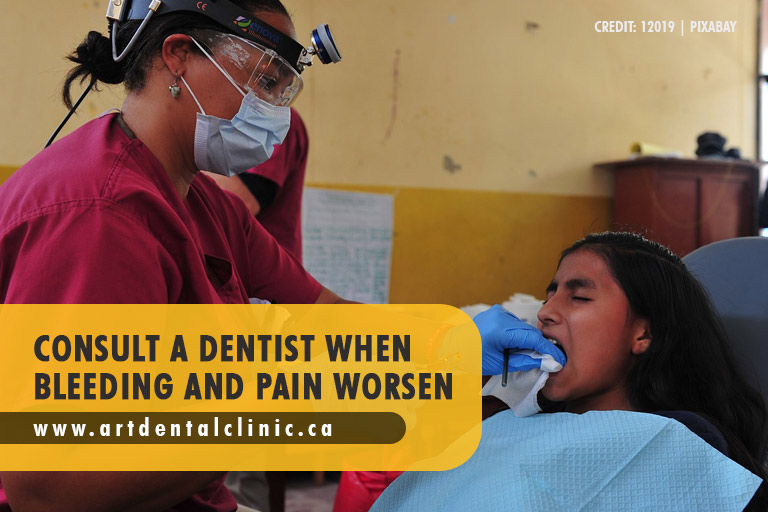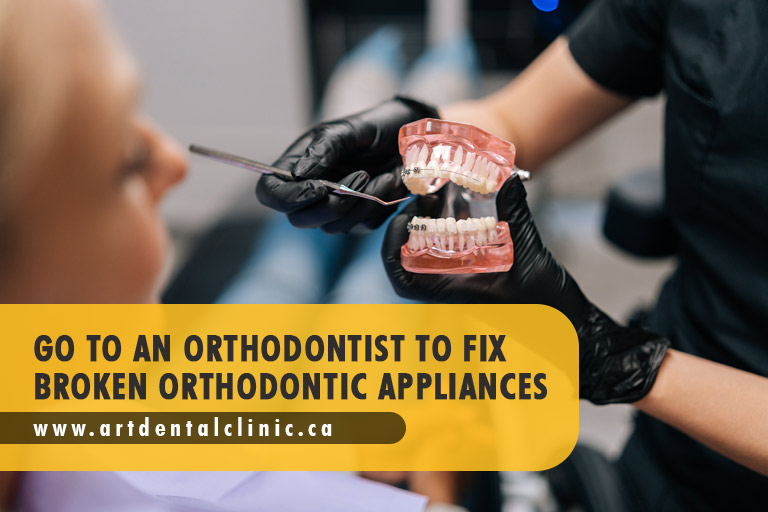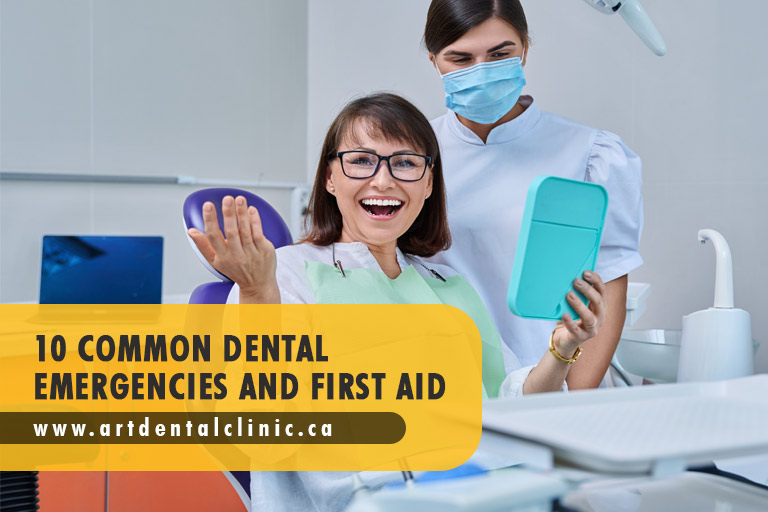If you accidentally cut your finger, you know what to do: clean the wound, put on a band-aid, or go to the emergency room if it’s serious. But when it comes to dental emergencies, most people don’t know what to do before seeing a dentist in Waterloo.
Some common dental emergencies include toothaches, bleeding gums, chipped or broken teeth, and lost fillings or crowns. While it’s important to maintain good oral hygiene and visit a dental office regularly, knowing how to handle a dental emergency can prevent long-term damage. Here are ten dental emergencies and how you can handle them.
1. Toothache
A toothache refers to pain or discomfort in and around a tooth. It can vary in intensity, ranging from mild sensitivity to severe, throbbing pain. Dental decay, gum disease, dental trauma, or infection are some of the causes of toothache. While you can manage some toothaches at home, specific symptoms, like swelling, require immediate attention.
Some temporary solutions to manage toothache symptoms include rinsing your mouth with salt water and taking over-the-counter pain relievers. To address this issue, schedule an appointment with an emergency dentist. Getting the dental treatment you need as soon as possible is crucial to determining the cause and preventing further tooth damage and infection.
2. Lost Filling or Crown
When teeth are damaged, fillings and crowns are necessary for restoration. However, if they become loose or fall out, it is important to seek prompt treatment to avoid further damage or infection. Finding a dentist as soon as possible is essential if you have lost a restoration. They may be able to re-cement it onto your tooth.
In the meantime, rinse your mouth with salt water and avoid chewing on the exposed tooth to maintain oral hygiene. Using temporary filling material or dental wax can also provide temporary protection until you can see an emergency dentist near you.
3. Chipped or Broken Tooth
You should not ignore a chipped or broken tooth because it can lead to further damage, infections, or complications. It would be helpful to rinse your mouth with warm water and use a cold compress wrapped in a cloth to reduce pain in the affected area of your face. This will help you manage the situation until you see a dentist.
Seeing a professional dentist is crucial to preserving your oral health and restoring your smile. In addition, you must save and bring the broken pieces when visiting your dentist’s clinic. Oral care professionals can evaluate the extent of damage and recommend appropriate treatment options.
4. Tooth Sensitivity
There may be underlying issues behind tooth sensitivity. If you suspect a dental infection, contacting your dentist immediately is crucial. They can assess the situation and provide appropriate guidance. Over-the-counter pain relievers like Tylenol can temporarily relieve discomfort until professional care is received.
5. Bleeding and Pain After Tooth Extraction

Some bleeding and pain are normal after a tooth extraction, but persistent or worsening symptoms may indicate a dental emergency. To minimize bleeding, place a clean gauze pad on the extraction site and apply gentle pressure by biting down on it. Avoid rinsing, eating, and drinking for a specified period as instructed by your dentist. Additionally, taking prescribed or over-the-counter painkillers aids in managing pain and preventing bacterial infections.
Contact your dentist to discuss your concerns and determine if further action is necessary.
6. Periodontal Abscess
If you notice a painful, swollen area on your gums, it may be a periodontal abscess requiring urgent attention. These infections can spread quickly and affect your oral health, including gums and teeth.
Make an appointment with an emergency dental clinic right away. In the meantime, rinsing your mouth with salt water several times a day can help draw the pus to the surface, providing some relief.
7. Loose Tooth
Adults with all their permanent teeth should never experience loose teeth. Having a loose tooth can happen after a fall or trauma. In such cases, contacting your dentist or visiting an emergency room is crucial. Also, notify your dentist about the incident and ask if they can meet you at the ER. They can evaluate the condition of your teeth and ensure there are no underlying jaw fractures, which can often be overlooked in an ER setting.
8. Broken Orthodontic Appliances

Orthodontic appliances, such as braces, are designed to withstand daily pressure. However, accidents or injuries can break or dislodge them. If you have a broken wire or loose bracket, it’s essential to contact your orthodontist promptly. They can guide you on repositioning the wire or provide instructions until your next appointment. In the meantime, covering exposed wire ends with dental wax helps prevent injury and discomfort.
9. Swelling
If you notice any swelling on your face or gums, it could be a sign of a severe infection or abscess. It’s important not to overlook swelling as it may lead to untreated complications. Be sure to contact your dentist right away to discuss your symptoms and get the appropriate treatment.
While waiting for professional care, try to stay upright as much as possible since lying down may worsen the swelling. You can also apply cold compresses externally to reduce swelling.
10. Mouth Sores
Mouth sores, such as canker or cold sores, can be painful and bothersome. While most heal within a week or two, there are steps you can take to manage the discomfort. An over-the-counter pain reliever can temporarily alleviate pain. Rinsing your mouth with a hydrogen peroxide mouthwash or warm salt water several times daily can also help clean the area and promote healing. If the sores worsen, don’t heal, or persist for an extended period, you should consult your dentist for further evaluation and treatment options.
Knowing how to respond to dental emergencies is crucial for oral health. Remember, professional dental care is essential in any emergency. So, contact an emergency dental clinic for immediate assistance. By acting swiftly, applying appropriate first aid measures, and following your dentist’s guidance, you can ensure an optimal outcome for your oral health emergency.
Ensure Optimal Dental Care with Art Dental Clinic
At Art Dental Clinic, we understand the importance of dental health. Our team of reliable Waterloo dentists is dedicated to providing you with exceptional care and support during dental emergencies.
Whether you’re dealing with a toothache, a broken tooth, a lost filling, or any other dental emergency, our skilled professionals are here to help. We offer prompt appointments, compassionate care, and effective treatments tailored to your needs. Call us at (519) 747-9797 or send an email to [email protected].

